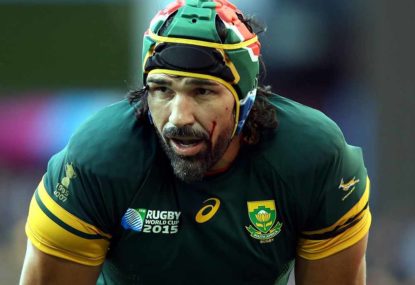At the Rugby World Cup in 2003, the Springboks played Samoa in Brisbane.
During the warm-up, when players were running along the dead-ball line in front of us, we marvelled at the athleticism of the new young talent in the South African side, Victor Matfield.
Matfield was already 26 by that stage, so it is staggering to think that he is still playing Test rugby three World Cups later, at the age of 38.
Much has been made of the age of certain players in the South African side, but it is not so much age which is the problem, rather the simple fact that age generally begets a decline in impact.
As a result, what we saw against Samoa was a two-speed South African side, a team which has 3-4 standout performers not only shouldering their own responsibilities, but carrying lesser teammates along with them.
In the first half particularly, before the replacements came into the match, Eben Etzebeth did his own open field work, and most of Matfield’s as well. Schalk Burger carried an anonymous Duane Vermeulen, and a direct and dangerous Damien D’Allende showed up the alarming decline in the impact of captain Jean de Villiers.
Against Samoa, who lacked anything like the attacking precision, innovation and fluent ball movement of Japan, the Springboks got away with it. They were aided by general ill-discipline from Samoa which allowed the Bokke to keep the scoreboard ticking over. But to hope that the likes of Matfield, de Villiers and Vermeulen could be carried in a critical quarter-final against the likes of England or Australia, is delusional.
Speaking of discipline, midway through the second half South Africa had conceded 12 penalties to Samoa’s 10, so they were really no better than their second-tier opponents. It’s important to note that hardly any of these penalties were forced by Samoan pressure. The problems related to a lack of precision at ruck time, going off their feet and coming in from the side. It was a sloppy display.
Despite this, Schalk Burger was immense. He carried relentlessly, supporting the ball carrier at every opportunity and making the gain line as a matter of course. His defence was tough and hard-shouldered, adding pressure to an already struggling Samoa outfit. Burger may not be captain on paper, but he is the inspiration and spiritual leader of this Boks team.
When Jesse Kriel came into the game, he underlined the flaw in coach Heyneke Meyer’s selection policy, by immediately creating uncertainty in the Samoa defence. Captain de Villiers, on the other hand, when he left the field in the 71st minute, had simply underlined his own predictability.
The other big replacement, Lood de Jager for Matfield, simply accentuated the limited physicality of the older man. de Jager’s withering hit on Tusi Pisi after half-time started the rot in Samoa’s optimism and they never recovered.
For their part Samoa played a deafeningly standard game. Kahn Fotuali’i and Michael Stanley struggled to get the ball to their impact players in Tim Nanai-Williams and Alesana Tuilagi, which may have presented some cause for hope.
Coach Stephen Betham’s game-plan had little variation or innovation. Samoa play a surprisingly conservative style with a slow tempo – much like one would expect from a top-tier side trying to slow a game down.
Unfortunately, Samoa don’t have the forward firepower to make the gain line consistently playing this way, so this style is largely ineffective for them, particularly against a large and physical team like South Africa. Unless they find some ball-movement and tempo before the end of the tournament, they won’t trouble many teams at all.
South Africa did what they had to do, and what they should have done in their opening match against Japan, and that was get a win. They were smart with goalkicking early and quickly stretched their lead beyond any real hope of a Samoa comeback.
There were moments of excellent skill. The crisp, direct passing for JP Pietersen’s second try, and Bryan Habana’s final effort showed that this Boks team can play with the best when so inclined.
However there remained a lingering uncertainty about the Springboks’ ability to assert dominance at the ruck, and it is hard not to wonder at the possible impact of a player not even in the wider Cup squad, Heinrich Brussow. The absence of a hard on-baller and fetcher in the Springbok team could be a critical weakness against the true contenders at the business end of the tournament.
The senior players in the Bok squad may have got them over the line here, but Australia, New Zealand and England won’t feel threatened if Matfield, de Villiers and Vermeulen continue to be picked as starters deeper in the tournament.
Heyneke Meyer could not possibly have missed the lift in tempo and edge that came with the introduction of Kriel, de Jager and Brits. Time will tell whether he is courageous enough to make hard calls on some senior players for the Scotland match.
Either way, what is overwhelmingly likely is that South Africa will face Australia or England in the quarter-finals. Australia have been a World Cup bogey team for the Boks, and England are at home. Either option will be very tough, and the time for experimentation and blind loyalty will be over.
South Africa may have won, but the pressure is on Meyer to make some hard calls before the Scotland match in seven days time.





























































































